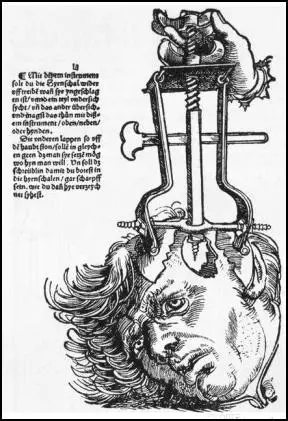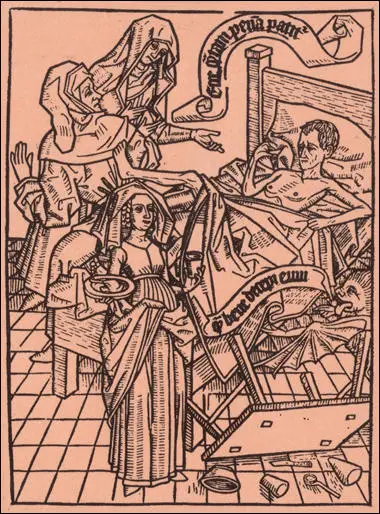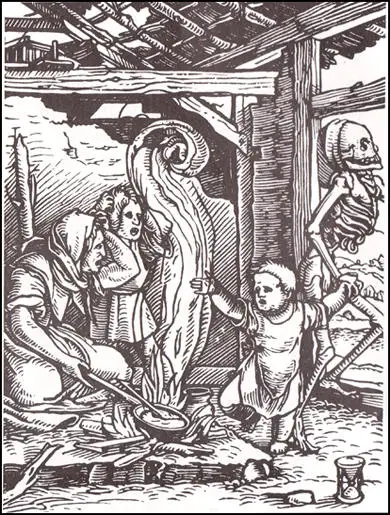Medical Treatment in the Middle Ages
A great deal of medical treatment in the Middle Ages was based on ideas developed by the Greeks and Romans. The most important aspect of this was the theory of the four humours. It was argued that the body had four humours: blood, phlegm, yellow bile and black bile. These humours were associated with different parts of the body and had different qualities: blood (heart: hot and moist); phlegm (brain: cold and moist); yellow bile (liver: hot and dry) and black bile (spleen: cold and dry).
It was believed that when someone was ill, the four humours in the body were not evenly balanced. A patient was usually advised to rest to allow the body to restore its natural balance. If this was unsuccessful, the patient's diet was altered. For example, if the patient felt cold, he or she would be given hot food.
If the change in diet failed to achieve success, and the patient was fairly prosperous, a surgeon would be called in. If the patient did not have much money, a barber-surgeon (an untrained doctor who spent most of his time cutting hair) would be used instead.

The surgeon would examine the patient and if he or she were hotter than usual it would be claimed that there was too much blood in the body. The solution to this problem was to remove some of the blood by opening the patient's veins with a knife. As well as blood-letting, surgeons could also carry out minor operations and deal with simple bone fractures.
There were also hospitals in the early Middle Ages. However, they were mainly used to isolate rather than to cure the sick. When people went into a hospital, their property was given away as they were not expected to survive.
One of the main ways of dealing with disease in the Middle Ages was by prayer. It was believed that people suffering from disease were probably being punished by God for sins they had committed in the past.
The Black Death that killed off about a third of the world's population had a dramatic effect on people's attitude towards medical treatment. Traditional methods of treating disease such as blood-letting, purging with laxatives, changing the diet of the patient, herbal remedies etc., were completely ineffective against the disease.
A great deal of discussion took place about the cause of the Black Death. Doctors were unable to come up with the right answer. However, several came close to identifying the cause. One doctor from Persia claimed that the
disease had been passed on to people by "mice and animals" that normally "lived under the earth". A doctor from Sweden argued that it was "fleas and vermin" that brought the Black Death.

Doctors became aware that it was important to build up a body of knowledge about disease. Scholars obtained copies of books written by doctors in other countries and had them translated into English. This was an important development, as in the past medical books in England were only available in Latin, which restricted the number of people who could read them.
In this way information was passed on about the successful treatment of diseases. For example, the Hotel Dieu, a large hospital in Paris, pioneered a new approach to dealing with patients. The hospital was divided into wards. Each ward dealt with different problems. People with broken bones would be treated in one ward while another dealt with infectious diseases.

The Hotel Dieu took great care over hygiene. All patients were given clean gowns to wear and had regular baths. Like all hospitals, patients still slept three or four to a bed but the sheets were changed every week. The floors of the wards were kept clean and the walls were washed down with lime.
Information about the successful treatment of patients in the Hotel Dieu soon spread to other countries. It was not long before doctors began to introduce similar reforms to their hospitals.
People's belief that prayer would protect them from disease was undermined by the Black Death. Some accepted the argument that the plague was a gift from God, and offered them an early entry into paradise. Others felt that the Church should have been able to warn them of the approaching disaster. It was also pointed out that while some priests stayed and helped the people in the village, many others fled. One of the interesting consequences of the Black Death was the growing tendency for people to leave money in their wills to hospitals rather than churches. This enabled an extra seventy hospitals to be built in England between 1350 and 1390.
Primary Sources
(1) Manuscript giving instructions for doctors (c. 1230)
During very hot weather phlebotomy (blood-letting) should not be undertaken because humours flow out quickly as the bad. Nor should phlebotomy be done in very cold weather, because the good humours are compacted in the body and difficult to draw out, and the good came out quicker than the bad... If the blood appears black, draw it off until it becomes red. If it is thick, until it thins out: if watery, until it becomes thick... Phlebotomy clears the mind, strengthens the memory, cleanses the stomach, sharpens the hearing, develops the senses, promotes digestion, produces a musical voice, feeds the blood, rids it of poisonous matter, and brings long life. It gets rid of diseases, cures pains, fevers and various sicknesses.
(2) Guy de Chauliac, Surgery (c. 1380)
The knowledge of anatomy is acquired in two ways; one is by books... the second way is by dissecting dead bodies, namely, of those who have been recently beheaded or hanged. By this means we learn the anatomy of the internal organs, the muscles, skin, veins and sinews.
(3) A Gest of Robin Hood (c. 1495)
She laid the blood-irons to Robin Hood's vein
And pierced the vein, and let out the blood,
And afterwards the thin,
And well then knew that there was treason within.
Student Activities
Disease in the 14th Century (Answer Commentary)
King Harold II and Stamford Bridge (Answer Commentary)
The Battle of Hastings (Answer Commentary)
William the Conqueror (Answer Commentary)
The Feudal System (Answer Commentary)
The Domesday Survey (Answer Commentary)
Thomas Becket and Henry II (Answer Commentary)
Why was Thomas Becket Murdered? (Answer Commentary)
Illuminated Manuscripts in the Middle Ages (Answer Commentary)
